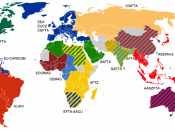Common Arguments For and Against Trade RestrictionsWhat are some of the common arguments for and against trade restrictions? Choose a position and describe why you think it is valid. Respond to a classmate who has selected a position that is different from yours. Did they provide valid rationale for their position? Why or why not?Arguments for trade restrictions include but are not limited to:â¢Trade restrictions protect domestic (home) industries from international competitors.
â¢Import restrictions reduce imports and secure local markets.
â¢Government funding to exporter's increases exports and helps create a trade surplus that protects the job market in local areas.
â¢Smaller companies would be less vulnerable from free trade.
â¢The growing reliance on imports may put national security at risk.
â¢Protect comparatively disadvantaged industries that are vital to national defense from import competitors to ensure that products and services i.e. footwear, machinery, bombs etc. will be available during wartime.
â¢Prohibiting trade with offending nations can be used as a form of punishment, deterrent or retaliation for intolerable behavior.
Arguments against trade restrictions include but are not limited to:â¢Trade restrictions could prevent the free flow of products and services and harm a nation's welfare.
â¢Consumers would lose the advantages of free trade i.e. lower prices for products and services.
â¢International trading companies would not be able to expand their efforts to sell products and services to developing nations.
â¢Nations would not be able attain a higher level of living by specializing in import products and services.
â¢Companies would not be able to obtain a comparative advantage by importing products and services they normally have a comparative disadvantage in local markets.
In my personal opinion, though trade restrictions may cause me as a consumer to have to pay higher prices for certain products or services, I would have to agree with...


